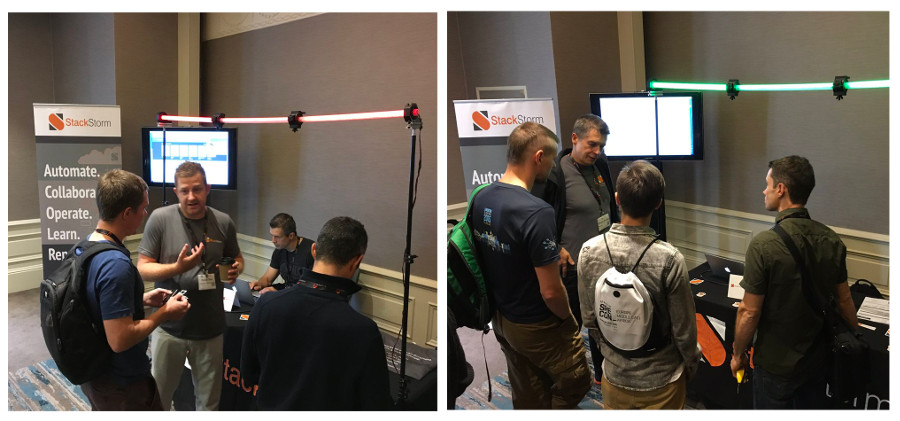The Event: 30th August – 1st September 2017, SRECon EMEA 2017, Dublin, Ireland
Event organiser: Usenix
Site Reliability Engineering is very much the natural evolution of the trusted system administrator and most would agree the SRE role embodies the core principles of DevOps. Google consider these people consultative and of huge value. Software for the masses has changed from monolithic monsters to complex architectures, driving the adoption of new skill sets required for system administrators to evolve to an SRE. It’s no longer about restarting large services at 3am; it’s about keeping the cattle alive and producing milk, whilst at the same time ensuring that the machinery is understood and utilised correctly. This could mean writing custom components to help with performance, availability, telemetry, reporting, managing workloads and dealing with alerts etc. For this gathering of SREs, Usenix chose the location and venue well. Ireland is a techhub for many start-ups and established organisations, most if not all have SREs under employment. Some 600+ people were booked in to the event, with huge attendance from the likes of Demonware, Facebook, Google and Indeed. Many smaller organisations and individuals were also in attendance to gain from the experience of others.
The SRECon agenda was wide and varied. Talking tracks on offer covered everything from building things with gRPC to culture and changing your workplace. Sometimes these kinds of events offer talks which at a surface level attendees do some head nodding but immediately forget. The difference with this group of people is they are enthusiastic and committed and it was clear to see from the corridor conversations and social events over the three days, just how seriously this discipline is taken.
If software forms the core part of a modern business, SREs are the frontline soldiers and events like this provide an opportunity for them to come together, learn and share experiences for the greater good.
StackStorm is designed to take the burden away from overworked and under-provisioned operationally involved people, for everything from deployment, testing and auto-remediation. It’s also great for on-boarding new staff and providing a single layer of access to operational ‘stuff’. Events like SRECon are the natural home to talk about and demo StackStorm. We met some great people, had some great conversations and learnt lots about what the attendees were doing for their organisations.
At the StackStorm booth, we had an LED lighting demo, which via a sensor read Tweets from our @Stack_Storm Twitter account. Every time a user Tweeted our username with the hashtag #SRECon, random colour settings would be deployed to the LED lighting tubes. Whilst it wasn’t a walking talking robot or flying car, these demos provide an excellent opportunity to talk about StackStorm. Most SRE operational scenarios can be broken down to an input, decision and an output. For the sake of conversation, decoupling where the input is sourced and what the output does, if this pattern can be applied, then the power of StackStorm can be harnessed. Our lighting demo allowed us to break SREs away from mulling over their domain based challenges for a few minutes using the same familiar thought mechanisms they’re used to dealing with daily.
Going back to the cattle and milk analogy used earlier in this post, StackStorm offers a way to re-use building blocks in workflows. These building blocks are written once, but can be re-arranged many times without a developer being involved. Through the concept of ‘packs’, StackStorm integrates against a myriad of systems and software, which are all downloadable and installable without leaving the platform. The TL;DR? The cattle machinery can be operated by a wider skill set, the quality of the milk is maintained and the cows give you less trouble.

StackStorm at SRECon Dublin 2017
We had many booth conversations over the three days and it was great to be told an SRE or organisation used StackStorm and even better to be told they contribute to the project. SRECon was an excellent event and allowed us to validate that StackStorm is relevant and positioned ideally to deal with the challenges of SREs.
To everyone we met during the three days, for all of the feedback and even the criticisms, thank you for your valuable time and we hope you enjoy the swag.
If you’re wondering how StackStorm can help you and your organisation, hit the landing page here and sign yourself up to our StackStorm community Slack group, where you can chat with existing users and reach out to the core team. Keep an eye out for our new releases and community packs and if you think there’s a gap, come and join the fun and contribute! Don’t forget to follow @Stack_Storm on Twitter for the latest gossip and news of meet-ups and events.
David Gee
StackStorm lover, trainer, contributor